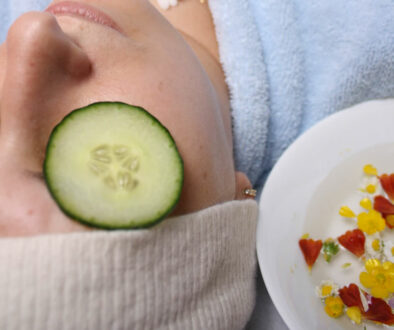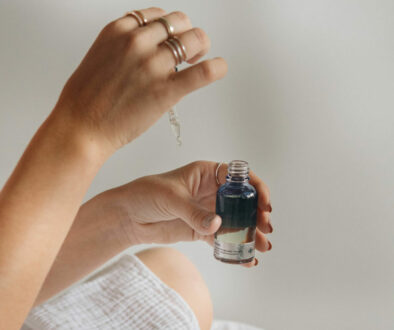The Ultimate Guide to Getting More Vitamin D in Your Diet
Vitamin D has been big news recently. This powerful nutrient has numerous benefits for our health; building stronger bones, boosting our immune systems, and possibly even helping to reduce the risk of cancer and heart attacks. But according to the NHS, most of us don’t get enough, especially in the winter months.

Taking a supplement can help – the NHS recommend taking 10mg / 400 IU of vitamin D a day between October and March – but there are also some foods you can choose that naturally contain vitamin D. This is our ultimate guide to the foods you need to eat to get more vitamin D in your diet. But before we get started, let’s have a look at the benefits of vitamin D for our health.
Why is getting enough vitamin D such a big deal?
Vitamin D plays several important roles in the functioning of a healthy body and new research is coming out on a regular basis as we understand more about how vital this vitamin is for our wellbeing. Here are some of the benefits vitamin D has for our health:
1. Building strong bones and teeth
Vitamin D helps with the absorption of calcium and phosphorous from our food. These two minerals are both vital to building strong bones and teeth. Not getting enough vitamin D in childhood can cause a disease called rickets, or osteomalacia in adults. This is when bones become too soft and weak, causing pain and eventually leading to bone deformities. A diet rich in vitamin D prevents these issues, as well as decreasing the risk of developing osteoarthritis in later life.
2. Protecting against upper respiratory diseases
Studies have found that getting enough vitamin D may help to prevent sicknesses like influenza (flu) and colds. There’s even some evidence that it may reduce the chances of becoming seriously ill from coronavirus – a major trial is being run by researchers from Queen Mary University of London to discover whether this is the case.
3. Reducing the risk of heart attacks and strokes
The British Heart Foundation (BHF) funded some research into vitamin D and cardiovascular disease and discovered a correlation between vitamin D deficiency and the risk of having a heart attack or stroke. Although they warn that the exact relationship is unclear, their advice is to make sure you have enough vitamin D in your diet to remain healthy.
4. Preventing cancer
A number of studies have looked into the relationship between vitamin D and the chances of getting cancer. Research is still ongoing, but there are signs that a diet rich in vitamin D may improve cancer survival rates and reduce the risk of relapse. This doesn’t hold true for all cancers, but promising results have been observed in patients with prostate cancer, colorectal cancer, and breast cancer.
5. Improving the symptoms of depression
It seems that vitamin D is not just important for our physical health, but our mental health too. Researchers looking at patients in Norway found that there was a correlation between vitamin D levels and symptoms of depression. Not only that, but those who took a vitamin D supplement reported a significant improvement in their mood.
Although the science is still emerging, it is becoming clear that vitamin D is vital for both our physical health and our mental wellbeing. So how do we make sure we get enough? Let’s take a look now at the possible sources of vitamin D.

Why are dietary sources of vitamin D important?
You might have heard vitamin D referred to as the sunshine vitamin. This is because it is a rare instance of a nutrient that our bodies can make themselves, as long as our skin is exposed to enough ultraviolet B rays from sunshine.
Unfortunately, living in the UK means that the sunshine isn’t strong enough in the winter months to provide the levels of ultraviolet B we need to meet our daily vitamin D requirements. With many of us working indoors, we may not be getting enough sunlight even during the summer. That’s why it is important to consider dietary sources of vitamin D along with regular exposure to sunlight.

Natural Sources of Vitamin D
Here are some of your best options for natural Vitamin D.
1. Oily fish
Certain types of fish are a great source of vitamin D, which is good news for seafood lovers. Look out for these oily fish in particular:
- Salmon – wild salmon especially provides a lot of vitamin D, around 988 IU per 100g. Farmed salmon isn’t quite as good, at around 250 IU per 100g, but that’s still a decent proportion of your daily target of 800 IU.
- Herring – you might have more difficulty finding fresh herring in a supermarket, but this little fish packs a powerful 216 IU of vitamin D per 100g, so it is worth looking out for. If you can’t find it fresh, pickled herring gives 112 IU per 100g.
- Mackerel – the strong taste of this oily fish isn’t for everyone, but for those who are fans, it is great for your vitamin D levels, with 360 IU per half-fillet.
- Halibut – if you aren’t a fan of the more pungent herring or mackerel, halibut is a good choice, bringing 384 IU in a half-fillet portion.

2. Eggs
For vegetarians or those who aren’t big fans of fish, eggs are another source of dietary vitamin D. A single large egg contains around 41 IU of vitamin D, so a portion of two or three eggs can get you closer to your daily goal. Most of the nutrients in eggs are found in the yolk, so avoid egg-white omelettes and opt for a dish that includes the full egg.

3. Mushrooms
If you are vegan or vegetarian, mushrooms are the way to go. They are the only plant-based source of natural vitamin D. Like humans, mushrooms rely on sunlight exposure to produce vitamin D, and many of the farmed options are grown indoors, so look for wild mushrooms or those that have been treated with ultraviolet light instead. The amount of vitamin D varies depending on the type of mushroom and the exposure to ultraviolet light, but is usually around 400 IU per 100g.
There is a difference though between the vitamin D that is produced by animals, including humans, and that produced by mushrooms. We produce D3, which is also found in animal sources such as eggs and fish, while mushrooms produce D2 instead. Fortunately, studies suggest that vitamin D2 can be absorbed into our bodies just as well as D3.

4. Fortified foods
Because vitamin D is so important to our health, it is added to some foods to help us increase our levels. Here are some foods that are commonly fortified with vitamin D:
- Plant milks – Unlike in the USA, it is rare for cows’ milk to be enhanced with vitamin D in the UK, but plant milks are often fortified. Check the label to choose a product with a high level.
- Cereals – many brands of breakfast cereal have added vitamin D. The nutrition label on the back of your favourite should indicate how much it contains per serving.
- Fat spreads – butter alternatives such as margarine are sometimes fortified with vitamin D.
- Fruit juices – continuing the breakfast theme, some fruit juices are also enhanced with vitamin D.
- Supplements – off-the-shelf Vitamin D supplements are available from pharmacies, health and wellness stores, supermarket and online. More on this below.
During the summer months, getting enough sunshine and eating a healthy diet that includes the foods listed above will likely be enough to get you to your daily vitamin D goal. But in the winter, when the sun makes only a rare appearance, it is a smart idea to take a supplement to make sure you are getting enough.
The NHS recommends taking a supplement that contains 400 IU of vitamin D. There are plenty of different options available on the market, and many multivitamins contain vitamin D too. Look out for combined calcium and vitamin D for extra benefits for healthy bones and teeth.
Search Vitamin D Supplements on Amazon
Can you take too much vitamin D?
It is possible to overdose on vitamin D, although very unlikely that you will get too much from diet and sunshine alone. If taking a supplement too, the NHS recommend not taking more than 4000 IU a day (100 mg), unless instructed to do so by your doctor. This is because taking too much vitamin D can lead to a condition called hypercalcaemia, where too much calcium builds up in the body. This leads to weaker bones and can damage your heart and kidneys, so be sure to check the levels in your supplement and steer on the side of caution. Always check with your doctor before starting a new supplement if you are on medication or have a medical condition.
Conclusion
There is no doubt about it, we all need to pay attention to our daily dose of vitamin D to keep our bodies and our minds healthy. Fortunately, there are some easy ways to make sure we get enough, combining dietary sources with time in the sun in the summer and supplements in the winter.
















